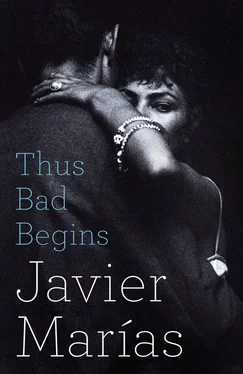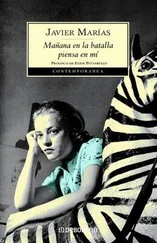But although we may more and more come to resemble that moon in our indifference and saturation, we who are still alive and active tend to endow our lives and acts with some special significance, even though, when measured against the accumulation of events, they have none and, in any case, they lose all significance — alas, even for us — as soon as we decide to talk about them to others, and they join the overflowing ranks of stories already told. ‘Ah,’ thinks the person hearing or reading or watching, ‘that story reminds me of another story, and now that I know it, seems almost predictable; it didn’t happen to me, and so it doesn’t surprise me and I only half-listen to it; what happens to others seems always so diffuse and rather unimportant and perhaps not even worth talking about.’ And the person telling the story feels something similar when he passes it on, as if putting it into words or images and in order were tantamount to cheapening and trivializing it, as if only the unrevealed or the unspoken preserved its prestige and uniqueness and mystery. ‘What to me was a grave and important fact — perhaps some vile deed I committed — becomes instead merely another story, nebulous and interchangeable, an original tale intended to amuse.’ Having told it, whether orally or in writing or in images, it doesn’t matter, you think: ‘What was remarkable for me as long as it remained secret and unknown becomes commonplace once revealed and tossed into the bag along with all the other stories heard and mixed up and forgotten and that can be reported and mangled by anyone passing, by whoever hears them, because once told, they’re present in the air and there’s no way you can stop them floating or flying if they get caught up in the mist or the wind pushes them along, and they travel through space and time disfigured by all the many echoes, worn thin by repetition.’
Beatriz returned home, and Muriel set off to Barcelona with Towers, who was still alarmed, suspicious and fearful for his project — with Lom and the other actors, troubled by what had happened to their director, but more than anything bewildered, wondering if he would be in a fit state to continue filming when his suicidal wife was some six hundred kilometres away, for they knew nothing about his normal treatment of her, about the constant rebuffs and occasional insults. ‘Lard, pure lard, that’s all you are to me,’ ‘I don’t think I can stand her any longer, I’ve got to close the door on her, I must,’ and the door had been kept firmly shut for a long time, after he had made the mistake of loving her all those years, with all his heart, as long, that is, as he had known nothing, and despite her not being the love of his life, ‘as people say’; or, according to her, having done the right thing: ‘You’ve probably never done anything better.’ To which he had responded oddly, gently, regretfully: ‘I’ll grant you that.’ He had, of course, added: ‘All the more reason for me to feel I’ve thrown away my life. A part of my life. That’s why I can’t forgive you.’ But perhaps that old love during all those years partially explained Muriel’s terrified reaction when he thought Beatriz might have been successful in her third attempt, carried out, deliberately one assumes, so close to home in the Hotel Wellington and on a night when they had invited guests to supper. It’s also frightening to lose the witness to the good things one has done, even if you’ve long since ceased to do good and have instead done things, which, to that same witness, have seemed evil and harmful.
Or perhaps they had been brought much closer when their firstborn died, because such events have one of two results: either one partner irrationally blames the other for not sensing the danger and failing to protect and save the child, with husband and wife becoming increasingly isolated, cut off, to the point where they can hardly bear to speak to or look at one another, or else they stand by each other and serve as both mirror and support: seeing their partner’s grief, the wife, say, takes pity on her husband and often takes his hand or suddenly caresses or embraces him when they pass in the gloomy corridor along which small, quick steps no longer run, children only being capable of moving from one place to another hurriedly, precipitately, because the child they were left with, Susana, could not yet walk. If she was fifteen or more now, that was how long it had been since the disappearance of the brother with whom she had coincided only briefly in the world and whom she never knew.
I had always felt sympathetic towards Beatriz Noguera, had always liked her; when I found out about the death of her child, I inevitably felt even more sympathy as well as something approaching respect; it’s impossible not to feel both things for someone who has suffered the loss of a child, who, however small, was already walking and babbling and asking a few elementary questions because he understood so little of the world around him. We also view with more interest someone who we know has had to overcome terrible grief and who never talks about it, mentions it or uses it to gain our pity. And so when Beatriz came home, looking thinner, but otherwise very well, with barely any visible signs that she had attempted to end her own life, she found me even more disposed to help and watch over her, to distract her and keep her company, as Muriel had instructed. He had, in effect, given me a reason to get closer to her, to talk to her, which I had always held back from doing before, out of a mixture of distance and shyness, fearing she might notice my theoretical feelings of embarrassment, of vague sexual admiration, something like the illusory desire aroused by a painting that I described earlier, but nothing more than that.
Rather than being released from hospital, it was as though she had returned from a sleep cure, her skin smooth and firm, her eyes bright, albeit quiet and slightly dreamy, even walking more lightly, more delicately, less determinedly, and nearly always wearing her high heels as if wanting to appear as attractive as possible for as long as possible or as if she were about to set off to one of her rendezvous, except that, during that time, she didn’t go out at all, apart from with Rico, who claimed he had stayed in Madrid in order to help, but was probably there in order to carry out some worldly manoeuvrings of vital importance to him alone, and who would turn up at the apartment to persuade her to go shopping or to a lecture or to a late-afternoon screening, even making impertinent jokes about her recent desperate action and about which she may have preferred not to talk.
‘When are you going to show me those cuts of yours, Beatriz? Don’t let them heal up without giving me a look at them while they’re still red raw,’ he would say tactlessly, being of the school that believes there is no better therapy than shock therapy, no better cure than making a mockery or a parody of any deep mental wound; and he would point at the bandages she had on her wrists, the only obvious sign of her recent hotel mishap or adventure. ‘I want to know how you did it, whether vertically or horizontally, methodically or just any old how, in the form of an X or a cross, with minimal artistic intent or like a barber suffering from Parkinson’s; in your place, I think I might have idled away the time playing noughts and crosses with the razor. Urfe, tirsto, érbadasz .’ He had days when he was more than usually given to uttering his unintelligible semi-onomatopoeia and would sometimes come out with three on the trot. Fortunately, he wasn’t living in the Middle Ages that he so worshipped or in his beloved Renaissance, because people then would have taken these for some diabolical language or oaths addressed to Beelzebub, and the Professor would have ended up being burned; I couldn’t resist imagining him tied to the stake, with his glasses on and (naturally) a cigarette between his lips, proudly declaiming exquisite speeches before being devoured by the flames.
Читать дальше












